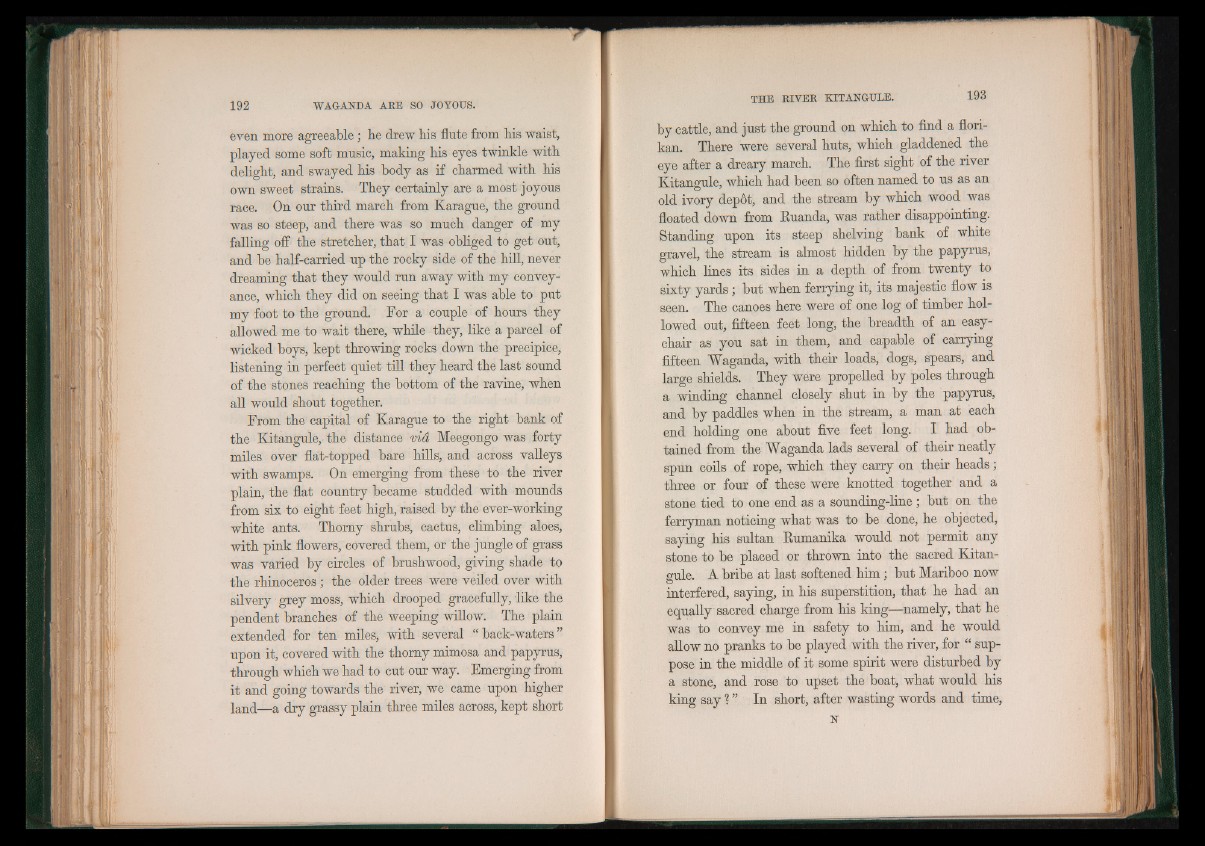
192 WAGANDA ARE SO JOYOUS.
even more agreeable ; be drew bis flute from bis waist,
played some soft music, making bis eyes twinkle witb
delight, and swayed bis body as if charmed witb bis
own sweet strains. Tbey certainly are a most joyous
race. On our third marcb from Karague, tbe ground
was so steep, and tbere was so mucb danger of my
falling off tbe stretcher, that I was obliged to get out,
and be half-carried up tbe rocky side of tbe bill, never
dreaming that tbey would run away witb my conveyance,
which tbey did on seeing that I was able to put
my foot to tbe ground. For a couple of hours tbey
allowed me to wait tbere, while tbey, like a parcel of
wicked boys, kept throwing rocks down tbe precipice,
listening in perfect quiet till tbey beard tbe last sound
of tbe stones reaching tbe bottom of tbe ravine, when
all would shout together.
From tbe capital of Karague to tbe right bank of
tbe Kitangule, tbe distance via Meegongo was forty
miles over flat-topped bare bills, and across valleys
witb swamps. On emerging from these to tbe river
plain, tbe flat country became studded witb mounds
from six to eight feet high, raised by tbe ever-working
white ants. Thorny shrubs, cactus, climbing aloes,
witb pink flowers, covered them, or tbe jungle of grass
was varied by circles of brushwood, giving shade to
tbe rhinoceros ; tbe older trees were veiled over witb
silvery grey moss, which drooped gracefully, like tbe
pendent branches of tbe weeping willow. Tbe plain
extended for ten miles, witb several “ back-waters”
upon it, covered witb tbe thorny mimosa and papyrus,
through which we bad to cut our way. Emerging from
it and going towards tbe river, we came upon higher
land—a dry grassy plain three miles across, kept short
by cattle, and just the ground on which to find a flori-
Pfl.n. Tbere were several huts, which gladdened tbe
eye after a dreary marcb. Tbe first sight of tbe river
Kitangule, which bad been so often named to us as an
old ivory dépôt, and tbe stream by which wood was
floated down from Kuanda, was rather disappointing.
Standing upon its steep shelving bank of white
gravel, tbe stream is almost bidden by tbe papyrus,
which lines its sides in a depth of from twenty to
sixty yards ; but when ferrying it, its majestic flow is
seen. Tbe canoes here were of one log of timber hollowed
out, fifteen feet long, tbe breadth of an easy-
chair as you sat in them, and capable of carrying
fifteen Waganda, witb their loads, dogs, spears, and
large shields. Tbey were propelled by poles through
a winding channel closely shut in by tbe papyrus,
and by paddles when in tbe stream, a man at each
end bolding one about five feet long. I bad obtained
from tbe Waganda lads several of their neatly
spun coils of rope, which tbey carry on their beads ;
three or four of these were knotted together and a
stone tied to one end as a sounding-line ; but on tbe
ferryman noticing what was to be done, be objected,
sayin g b is sultan Rumanika would not permit any
stone to be placed or thrown into tbe sacred Kitangule.
A bribe at last softened him ; but Mariboo now
interfered, saying, in bis superstition, that be bad an
equally sacred charge from bis king—namely, that be
was to convey me in safety to him, and be would
allow no pranks to be played witb tbe river, for “ suppose
in the middle of it some spirit were disturbed by
a stone, and rose to upset tbe boat, what would bis
k in g say % ” In short, after wasting words and time,
N